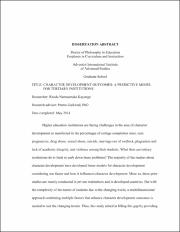Character development outcomes : a predictive model for tertiary institutions
Abstract
Higher education institutions are facing challenges in the area of character
development as manifested in the percentages of college completion rates, teen
pregnancies, drug abuse, sexual abuse, suicide, marriage out of wedlock, plagiarism and
lack of academic integrity, and violence among their students. What then can tertiary
institutions do to limit or curb down these problems? The majority of the studies about
character development have developed linear models for character development
considering one factor and how it influences character development. More so, these prior
studies are mainly conducted in private institutions and in developed countries. But with
the complexity of the nature of students due to the changing world, a multidimensional
approach combining multiple factors that enhance character development outcomes is
needed to suit the changing trends. Thus, this study aimed at filling this gap by providing
a starting point through developing a predictive model for character development
outcomes.
A survey questionnaire composed of 7 scales was administered to a total of five
hundred and one 3rd and 4th year students in selected state universities and colleges in
Cavite, Philippines for data collection of this study. The independent variables were inclassroom
interaction, out-of-classroom interaction, school climate, personal lifestyle,
home environment, and peer influence and the dependent variable was character
development outcomes. Using structural equation modelling, this study developed a
model to explain character development outcomes among students in state universities
and colleges. Particularly respondents were the students in the 3rd year and 4th year of
study.
The predictive model developed explained 57% of the variance in character
development outcomes. Findings from the results of the analysis showed that inclassroom
interactions have a substantial direct influence on character development
outcomes of the students (r = .75, p < .05). In addition, out-of-classroom interaction,
school climate, and home environment contribute to students’ character development
outcomes but in an indirect way.
From the findings of this study, we can conclude that the classroom holds a
significant location for teachers to teach, model, and integrate character development
among their students. Basically, colleges and universities should seek to deliberately
boost and implement experiences that cultivate character in the classroom like improving
faculty-student relationships, student-student relationships, and active participation of
students in classroom leadership roles and activities.


